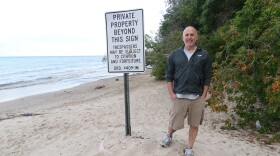Milwaukee is no stranger to civil rights protests. The city’s open housing marches have become the stuff of legend. For 200 consecutive nights, demonstrators marched from Milwaukee’s predominantly black north side to the predominantly white south side.
Now, Milwaukeeans have taken to the streets once again, this time to protest police brutality. One of the goals protesters are trying to achieve is to change how police interact with communities of color. Reggie Jackson, head griot of America’s Black Holocaust Museum, says many people don't know the extent of this issue.
>>Read WUWM & NPR Full Protest Coverage
"Most people are completely unaware that over a thousand Americans each year are killed in encounters with the police. That’s an average of three per day, one every eight hours," Jackson explains. "There is something fundamentally flawed when every eight hours an American will lose their life in an encounter with the police."
"Most people are completely unaware that over a thousand Americans each year are killed in encounters with the police. That's an average of three per day, one every eight hours."
Despite a long history of civil rights movements, Jackson says this country has yet to see meaningful police reforms.
"I want to see big changes, fundamental changes that say: listen, there is something wrong with what we do. And I haven't heard any police departments make that announcement...They'll say, 'Well, you know, there's always some bad apples.' It's not bad apples, it's the whole cart, it's flawed. There's something wrong with the cart the apples are in," he says.
>>Milwaukee Protesters In Their Own Words
>>History Of Policing In America: Starts And Ends With Protecting Private Property
Jackson says Milwaukee's police have always had a tumultuous relationship with the city's black community, which began to grow in the 1940s. He says there has always been mistrust on both sides, and adds that things are unlikely to change if the attitude among law enforcement remains the same.
"Until you start treating police officers who commit crimes the same way as civilians who commit crimes, you will never have the trust of the black community and the Latino community," says Jackson.






